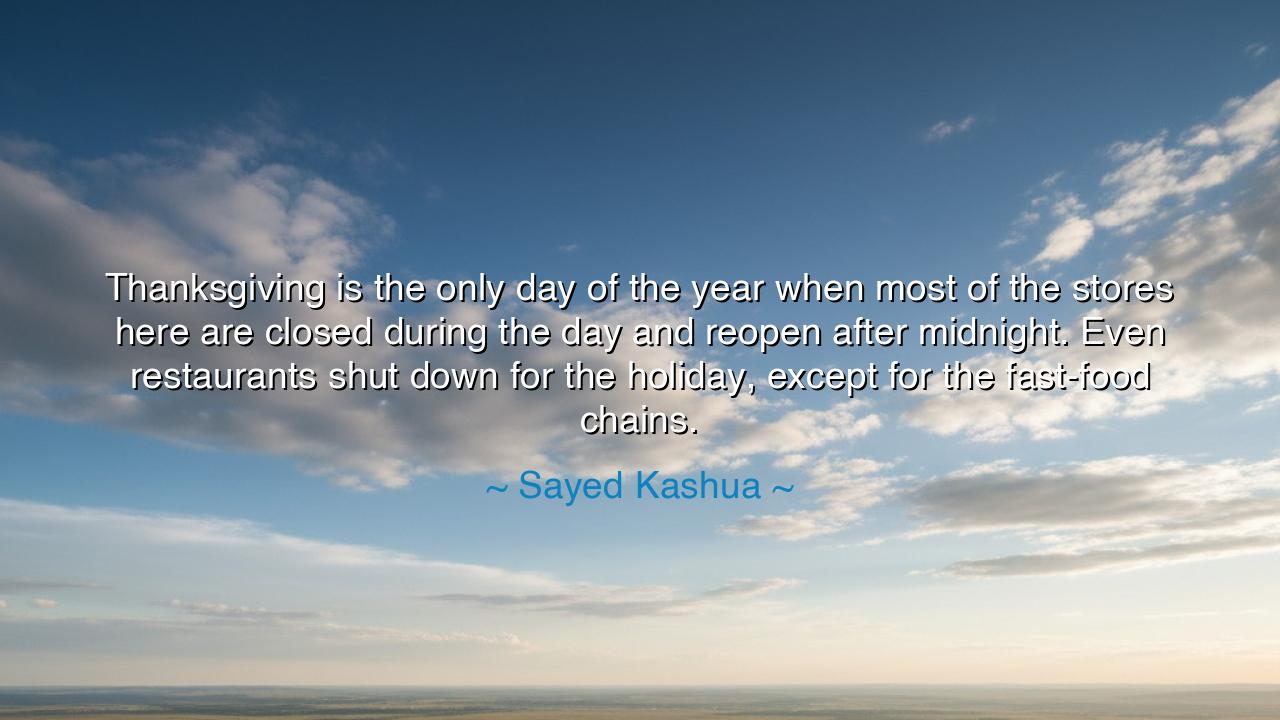
Thanksgiving is the only day of the year when most of the stores
Thanksgiving is the only day of the year when most of the stores here are closed during the day and reopen after midnight. Even restaurants shut down for the holiday, except for the fast-food chains.






In the words of Sayed Kashua, we are reminded of the strange, almost sacred pause that descends upon a restless land: “Thanksgiving is the only day of the year when most of the stores here are closed during the day and reopen after midnight. Even restaurants shut down for the holiday, except for the fast-food chains.” Though spoken plainly, the image carries great weight. In a world that rarely stops its endless commerce, a day of silence, of rest, of closed doors and waiting lights, takes on the character of holy ritual.
The closing of stores is more than the absence of trade; it is the recognition, if only for a day, that there are values higher than profit, duties greater than labor, and bonds deeper than transaction. On Thanksgiving, the society that worships consumption dares to pause, if only briefly, and allow the hearth to overshadow the marketplace. Even restaurants, which serve the constant appetite of the people, dim their fires so that families may serve one another at their own tables. In this, Kashua reveals a paradox: that in a land defined by endless buying and selling, the true spirit of a nation can be glimpsed most clearly when the wheels of commerce are still.
The ancients too knew this rhythm. In the days of Rome, great festivals such as Saturnalia suspended the ordinary flow of life. Work was halted, debts were forgiven, and the people feasted together, rich and poor alike. The suspension of commerce was not seen as loss but as gain, for it reminded all that man was not born merely to toil, but to rejoice, to remember, and to belong. So too, Thanksgiving is not simply a meal but a recognition that life must be more than business; it must be communion.
Yet Kashua does not let us rest easily, for he notes that the fast-food chains remain open. Here lies both irony and warning. While the mighty stores close their gates, there still remains the relentless hunger of convenience, the refusal of some to step away from transaction even for one day. It is a reminder that though a pause is written into the culture, the temptation of constant motion never fully sleeps. The fast-food window glows as a sign that the spirit of ceaseless consumption lingers even amid the silence.
Consider the story of the Sabbath among the ancient Hebrews. Though neighboring nations toiled without ceasing, the Hebrews set aside the seventh day for rest, a command given not only to the rich but to the poor, not only to men but to beasts of burden. To close the gates of labor was not weakness, but strength: it was to declare that life is not owned by toil or profit but by God, family, and community. So too with Thanksgiving, whose closed stores echo the same truth—though in a different tongue—that there is meaning beyond endless striving.
The lesson for us is this: honor the pauses in life. Do not lament that the stores are closed, but rejoice that for once, the race is stilled, and hearts may turn to gratitude. Beware, however, of the temptation to rush immediately into the next transaction, as the midnight openings beckon. True thankfulness is not measured by how swiftly one returns to buying, but by how deeply one dwells in the silence of gratitude.
Practical wisdom follows. On days of rest, do not rush to fill them with busyness; instead, sit with family, share stories, and give thanks for what cannot be bought. Let your home become the feast, your words become nourishment, and your presence become the gift. When the world reopens its shops and bright lights, you will carry within you a treasure that no purchase can replace.
Thus, the reflection of Sayed Kashua becomes a teaching for the generations: the closing of the stores is not mere inconvenience, but a window into the soul of a people. For when the noise of commerce is silenced, even for a day, we are given the chance to remember what is most essential—gratitude, fellowship, and the quiet joy of being together.






AAdministratorAdministrator
Welcome, honored guests. Please leave a comment, we will respond soon